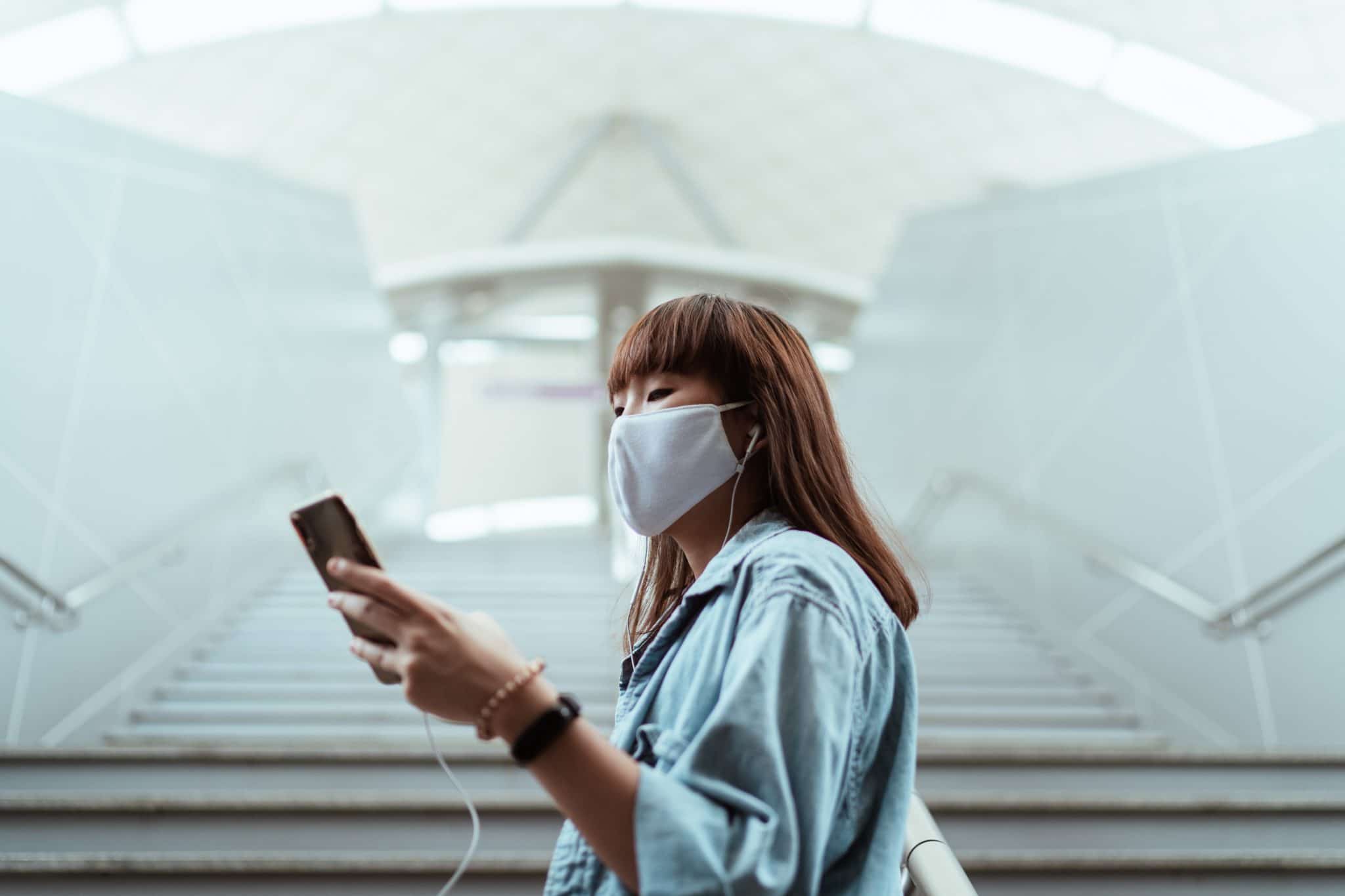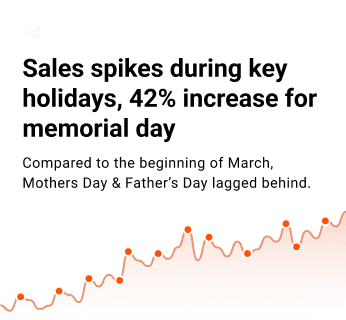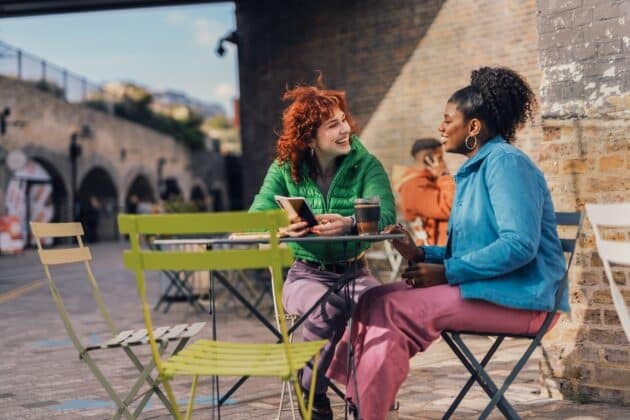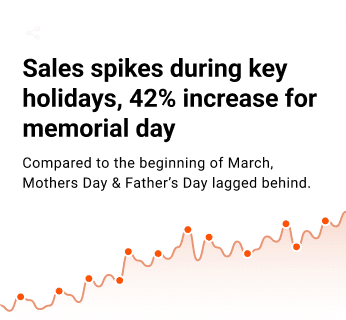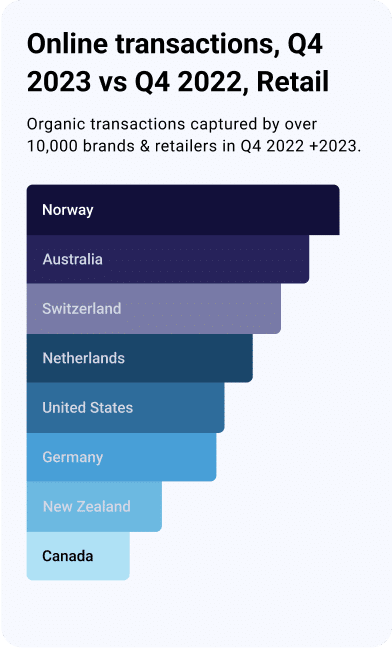Many consumers’ lives changed overnight when countries put lockdown orders in place to stop the spread of the coronavirus.
Not only were consumers told to stay in their homes as much as possible, but local restaurants, bars, gyms, retail stores, and other non-essential businesses closed temporarily. Many people started working and attending school online from home. Travel plans, events, and gatherings of family and friends were canceled or postponed.
During this time, consumers got used to doing everything virtually.
Now, lockdown orders are easing up in countries where coronavirus cases are declining. Consumers can return to their favorite stores and restaurants and see friends and family while practicing social distancing and wearing face coverings.
However, in countries like the US, Brazil, and India, coronavirus cases are still increasing and lockdown orders could return.
How are consumers around the world responding to the uncertainty around the coronavirus? It might be possible to do more activities outside the home… but are they?
A Tale of Two Attitudes
At Criteo, we surveyed consumers in mid-May and we heard from over 13,000 people around the world who experienced partial or complete lockdown at some point during the coronavirus outbreak. We wanted to know what new behaviors they adopted during quarantine and what activities they were eager to get back to outside their homes.
Our survey found that overall, about half (52%) of consumers said that they liked being at home during quarantine and want to continue spending time at home. But even more consumers said they would feel comfortable visiting relatives (64%) and returning to an office (64%) by this month. Understandably, fewer consumers said they would feel comfortable attending a large event (21%) or taking a plane (22%) by now.
Every country is at a different stage in the economic rebound and consumer behaviors will vary depending on where people live and how they’ve been affected by the virus. We wanted to break down our survey results country by country to see what activities consumers feel comfortable doing based on their location.
Here, we’re looking at global trends in social activities, businesses and events, work and school, and travel:
Social Activities
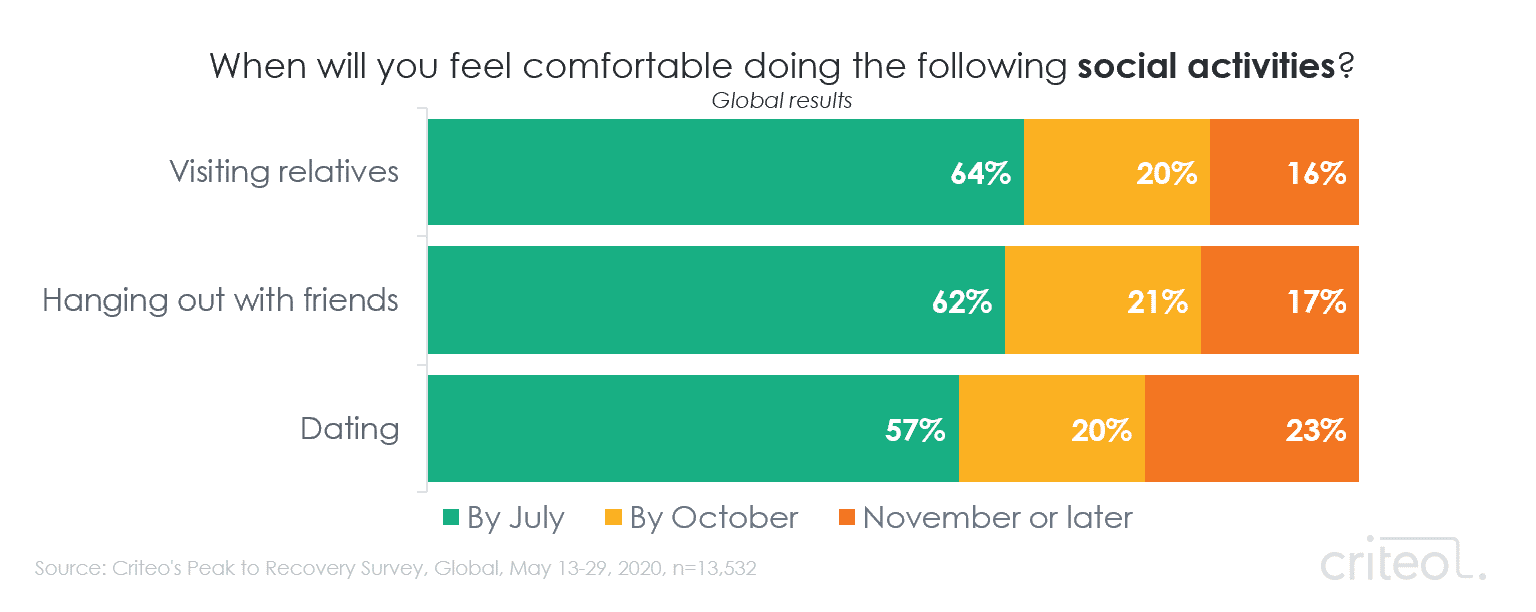
Globally, consumers feel comfortable seeing their friends and relatives in person. By October, 83% of people say they’ll hang out with friends. Many governments are allowing small gatherings of 10 people or less as long as everyone practices social distancing and wears face coverings.
People in France Want to See Their Friends
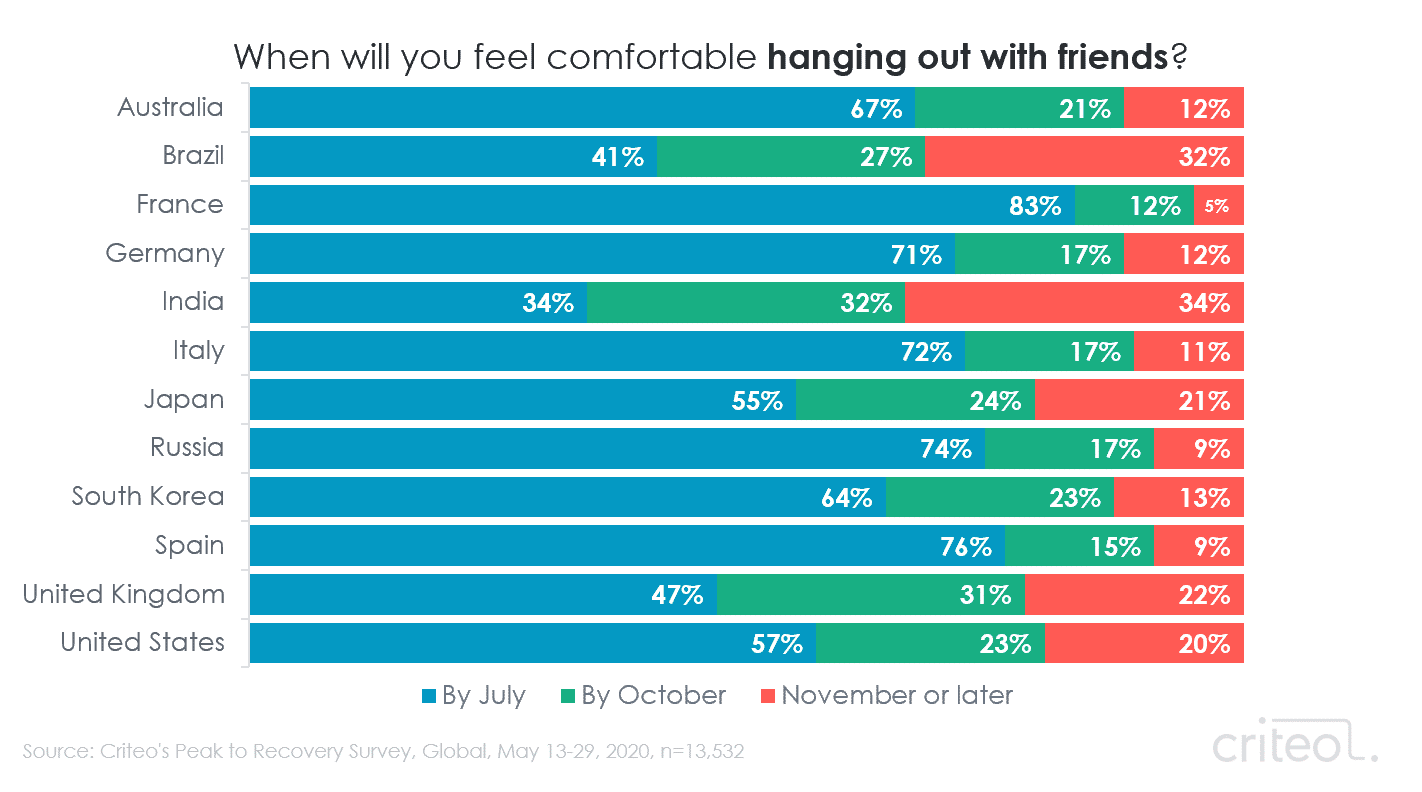
France had the highest number of people reporting that they feel comfortable hanging out with their friends this month (83%) and only 5% won’t feel comfortable doing so by November. Most people in neighboring countries like Spain (76%), Italy (72%), and Germany (71%) also say they’re ready to hang out with their friends. People in Russia—where a partial lockdown started in March and has been lifted—are ready to see their friends as well (74%).
Italy and Brazil Want to Start Dating Again
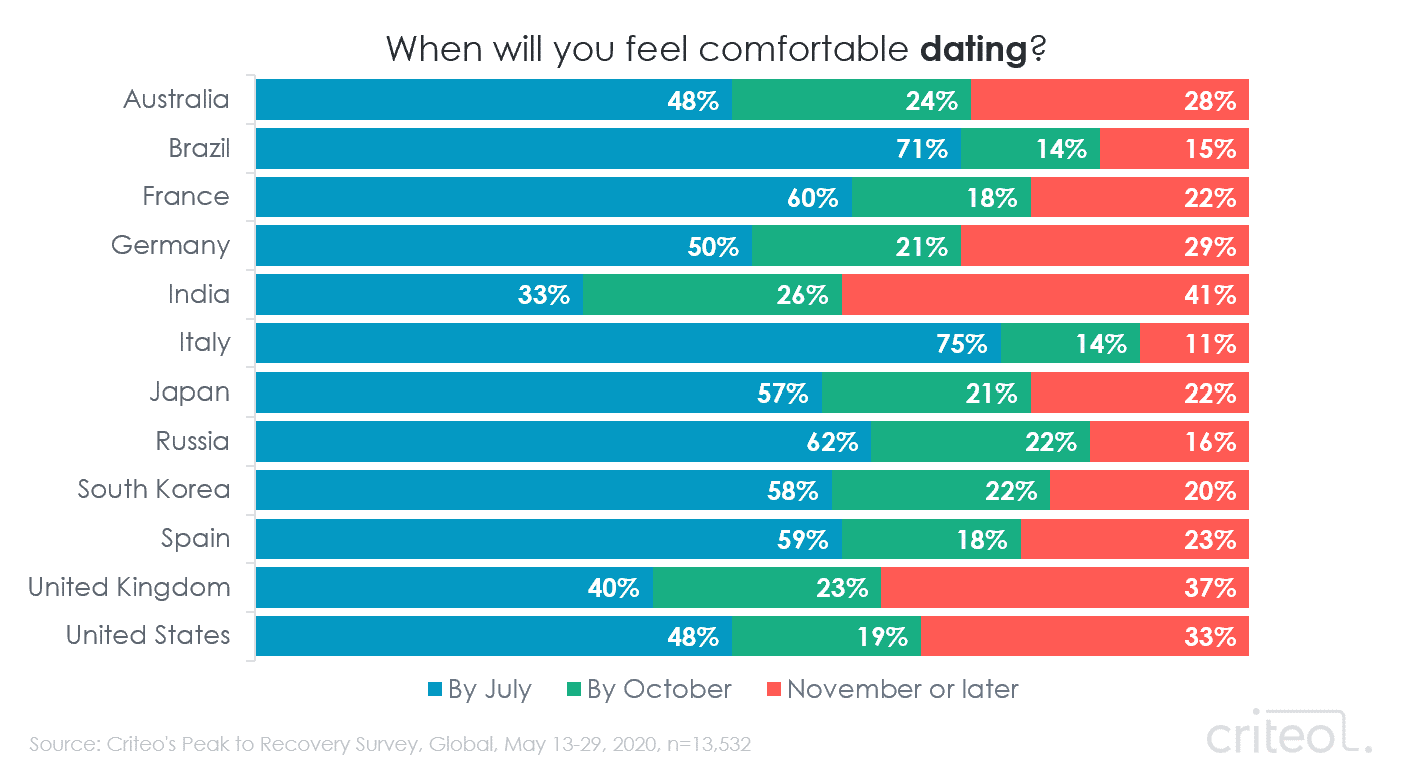
In our survey, we saw the most willingness to get back to dating in Italy and Brazil, where 75% and 71% of people, respectively, feel comfortable going out on dates this month. This number is surprising for Brazil, where coronavirus cases are still increasing.
Businesses & Events
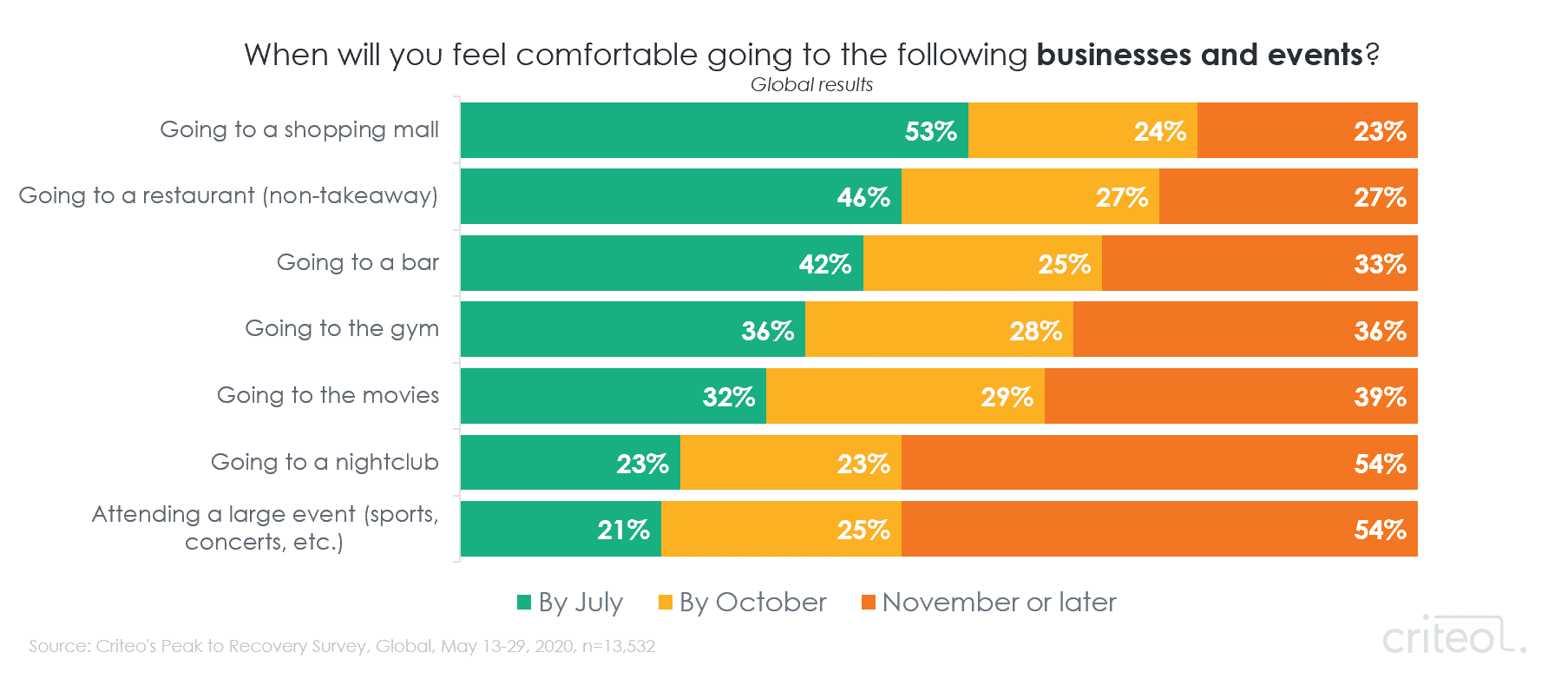
Around the world, consumers feel most comfortable going back to shopping malls (53%) and eating at restaurants (46%) this month. By October—right before the holiday shopping rush—77% of consumers say they’ll go shopping.
On the other hand, most people are still avoiding crowded, indoor events. Few people say they feel comfortable going to a nightclub (23%) or attending a large event (21%) this month. Even by November, half (54%) of the world’s population still won’t feel comfortable going to these types of gatherings.
Consumers in France, Russia & Australia Are Ready to Shop
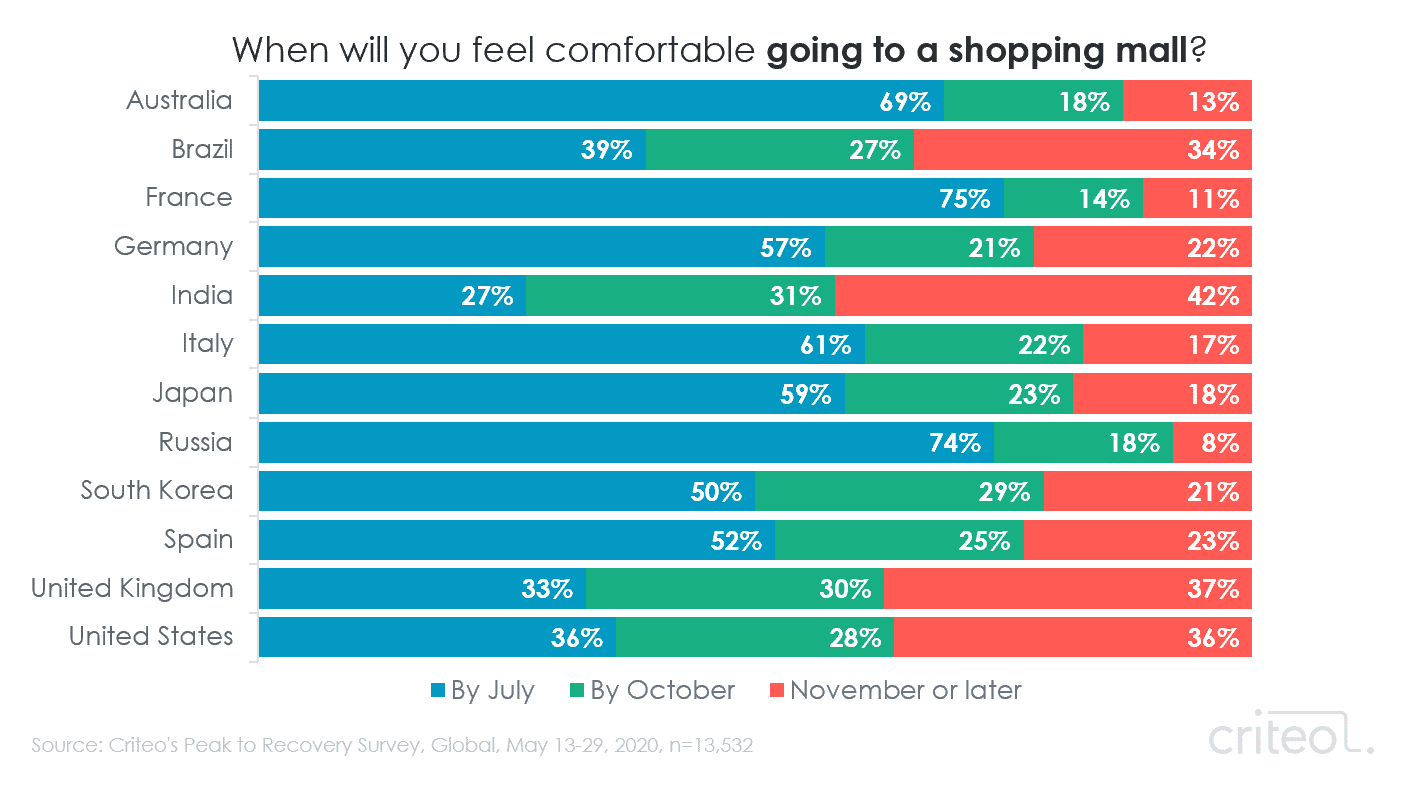
We see varying levels of comfort with going to shopping malls country by country. In France, 89% of consumers say they’ll feel comfortable going to a shopping mall by October. This number drops in countries where coronavirus cases are still rising, like the US (64%) and India (58%).
Spain & Japan Want a Taste of Their Favorite Restaurants
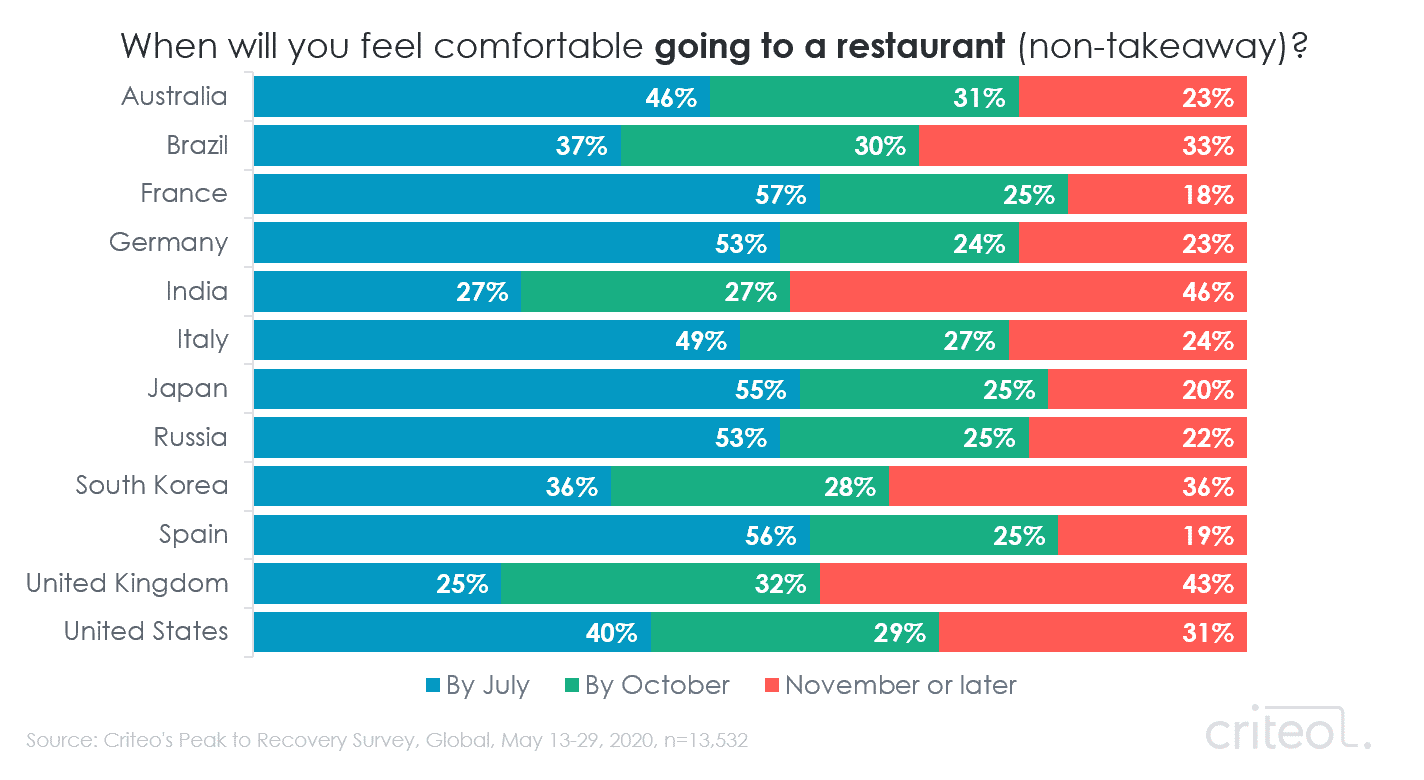
Compared to shopping malls, consumers feel a little more hesitant to return to restaurants. People in France (57%), Spain (56%), and Japan (55%) are most eager to return to their favorite restaurants this month, followed by Russia (53%) and Germany (53%). The outdoor seating options popping up at restaurants could accelerate this trend in many countries.
Italy Wants Its Bars Back
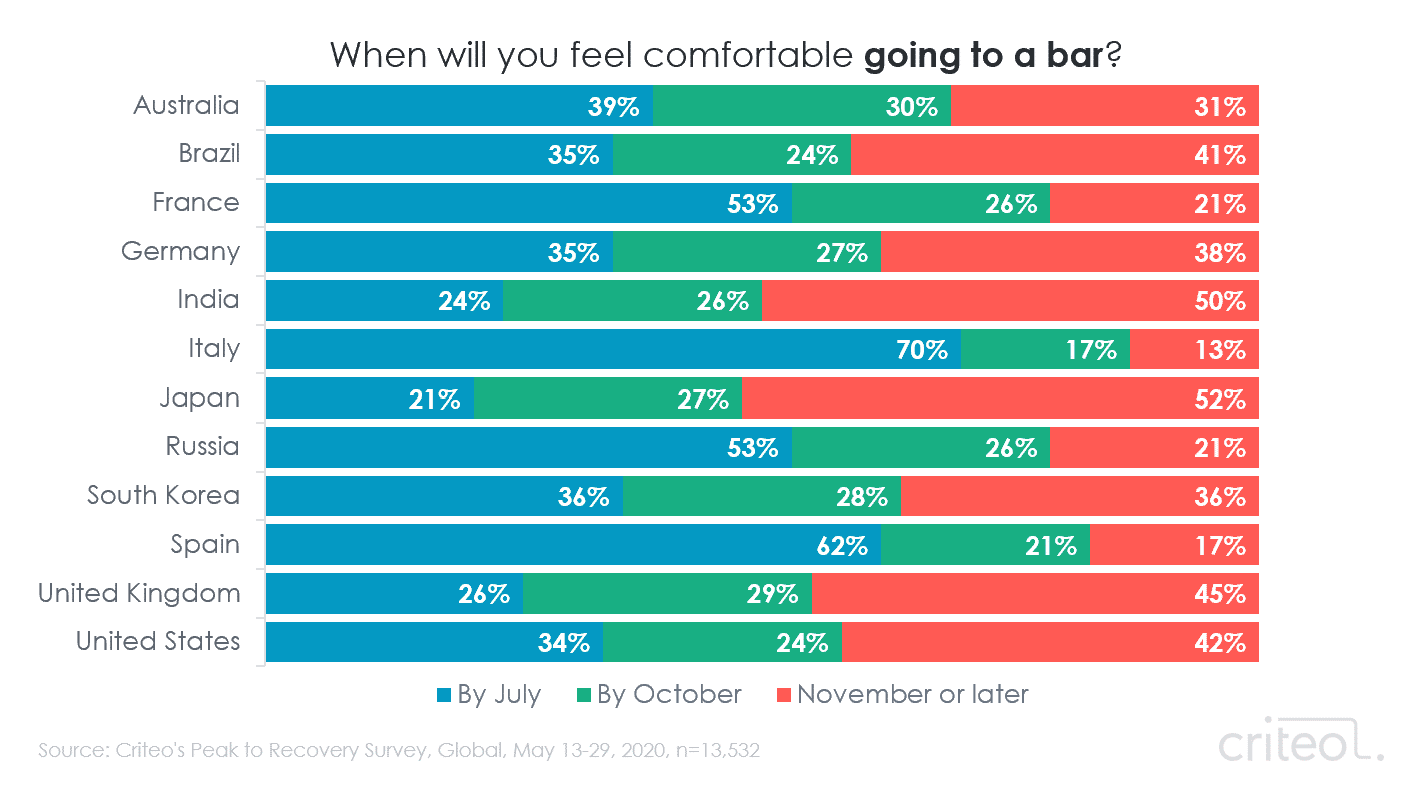
Interestingly, the number of people who are willing to return to bars differs from the percent that want to return to restaurants. For example, more people in Italy are comfortable going to a bar this month (70%) than a restaurant (49%). But in Japan, only 21% are comfortable going to a bar vs. 55% who are comfortable going to a restaurant.
Work & School
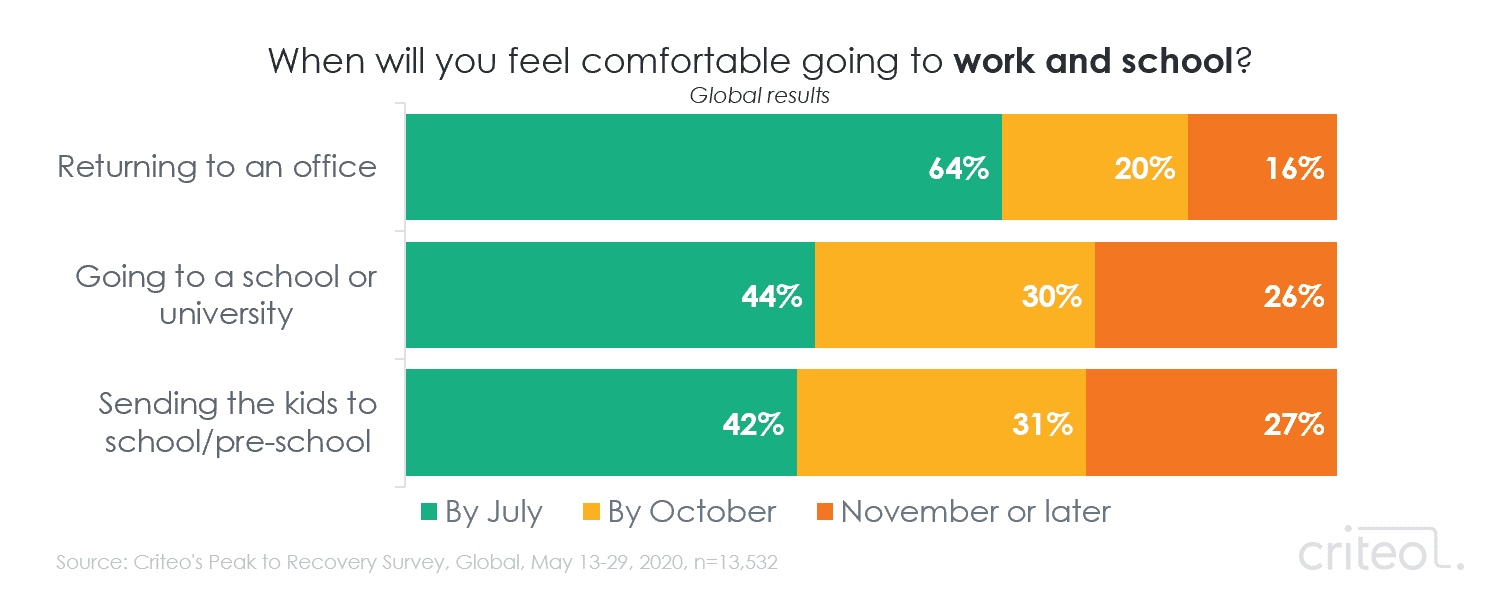
Offices and schools are enclosed spaces where the coronavirus is reported to spread more easily. But 84% of people would return to their office by October. Students don’t feel as comfortable returning to classes by October (74%) and parents don’t feel as comfortable sending their kids to school (73%).
France & Russia Want to Get Back to Work
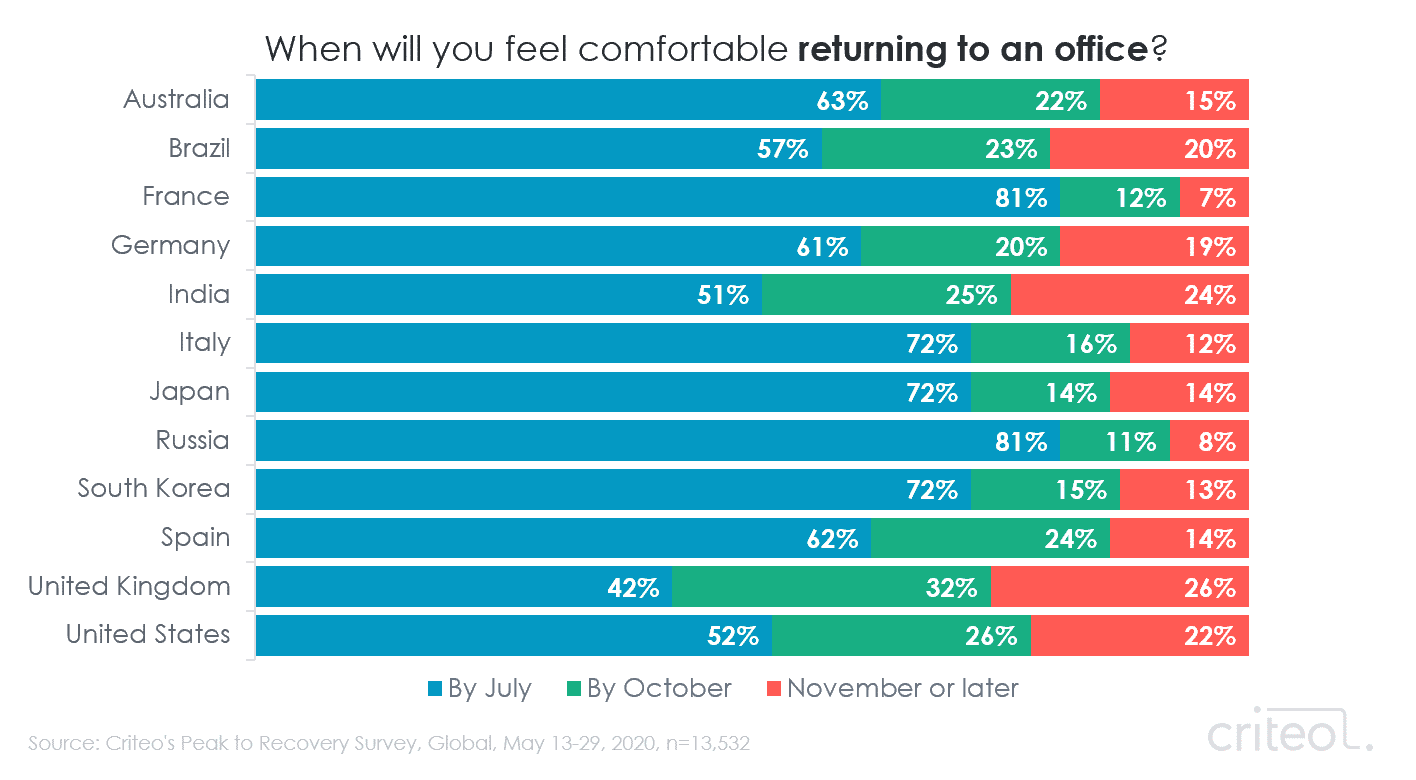
In countries where the spread of the virus has slowed, most people feel comfortable going back to work. Even in a country like India, where there’s a strong work ethic but coronavirus cases are still on the rise, our survey found that 76% of people would return to work by October.
Travel
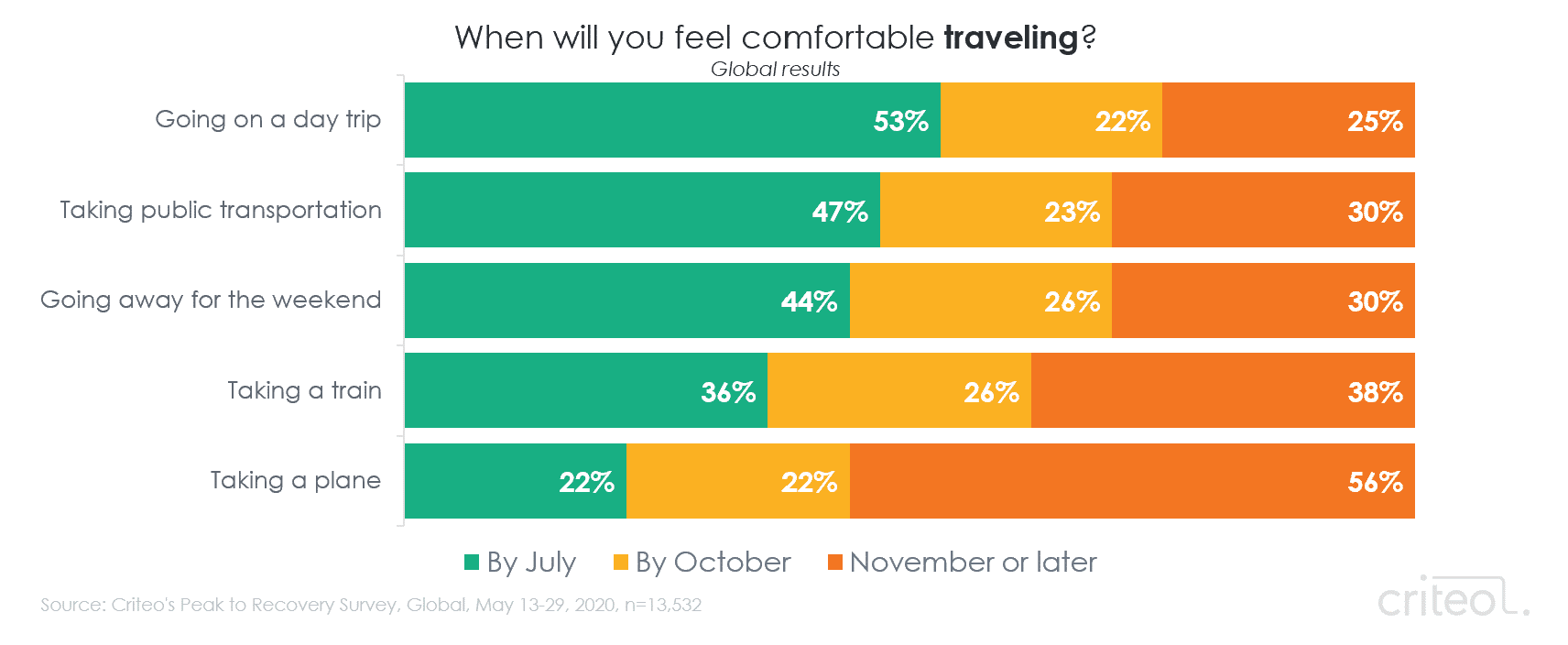
Consumers around the world are taking shorter trips to get their travel fix. Since 56% of people won’t feel comfortable taking a plane until November or later, this month they are going on day trips (53%) and weekend getaways (44%) rather than traveling a far distance for an extended stay. Home and car rentals are growing in popularity around urban areas as more people want to escape their crowded city for a few days.
Day Trips Are Most Popular in France
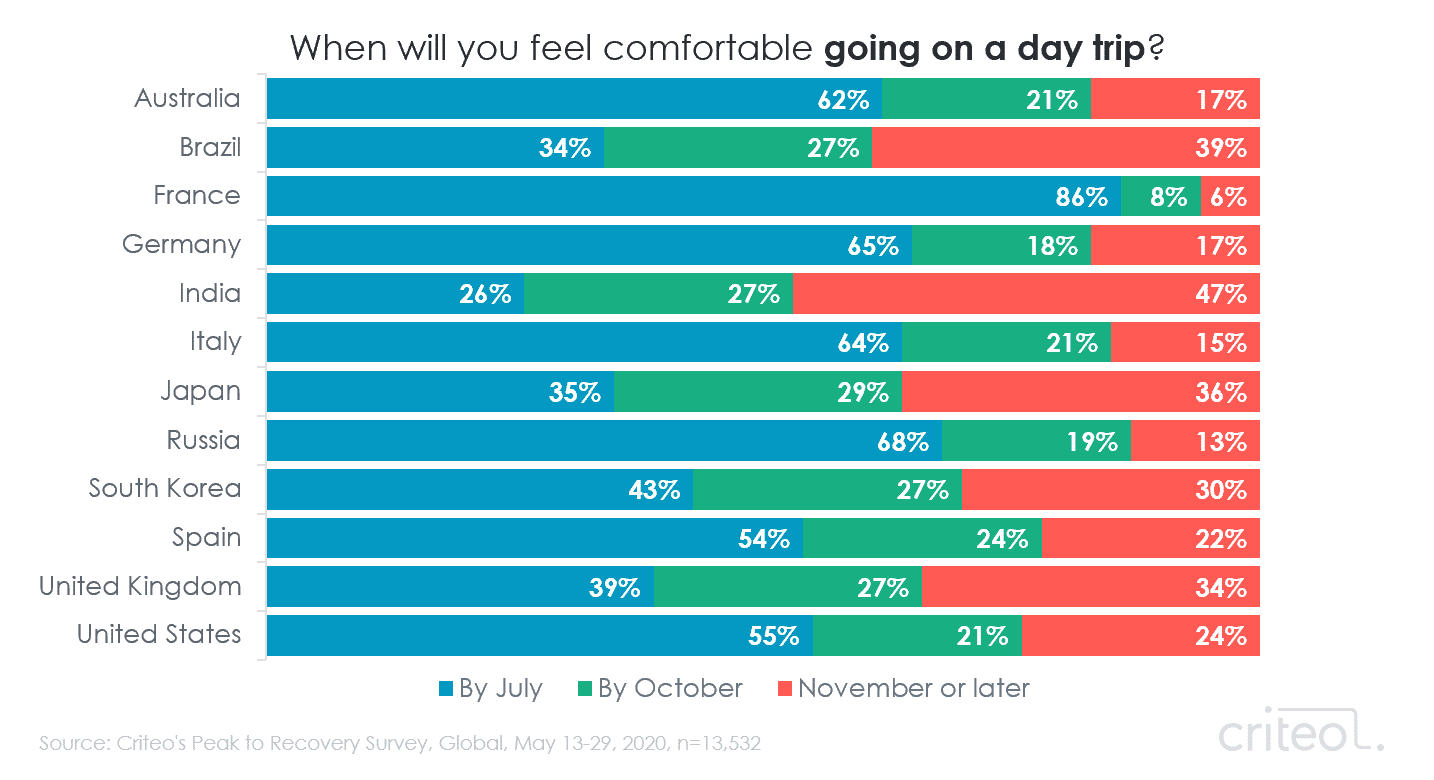
The majority of people in every country we looked at will feel comfortable taking a day trip by October. In France, this percentage is highest at 94%, whereas in Japan, 64% of people will feel comfortable taking a day trip by October despite a decline in coronavirus cases. Access to cars is a deciding factor for many consumers when they want to take a day trip.
Russians Are Embracing the Weekend Getaway
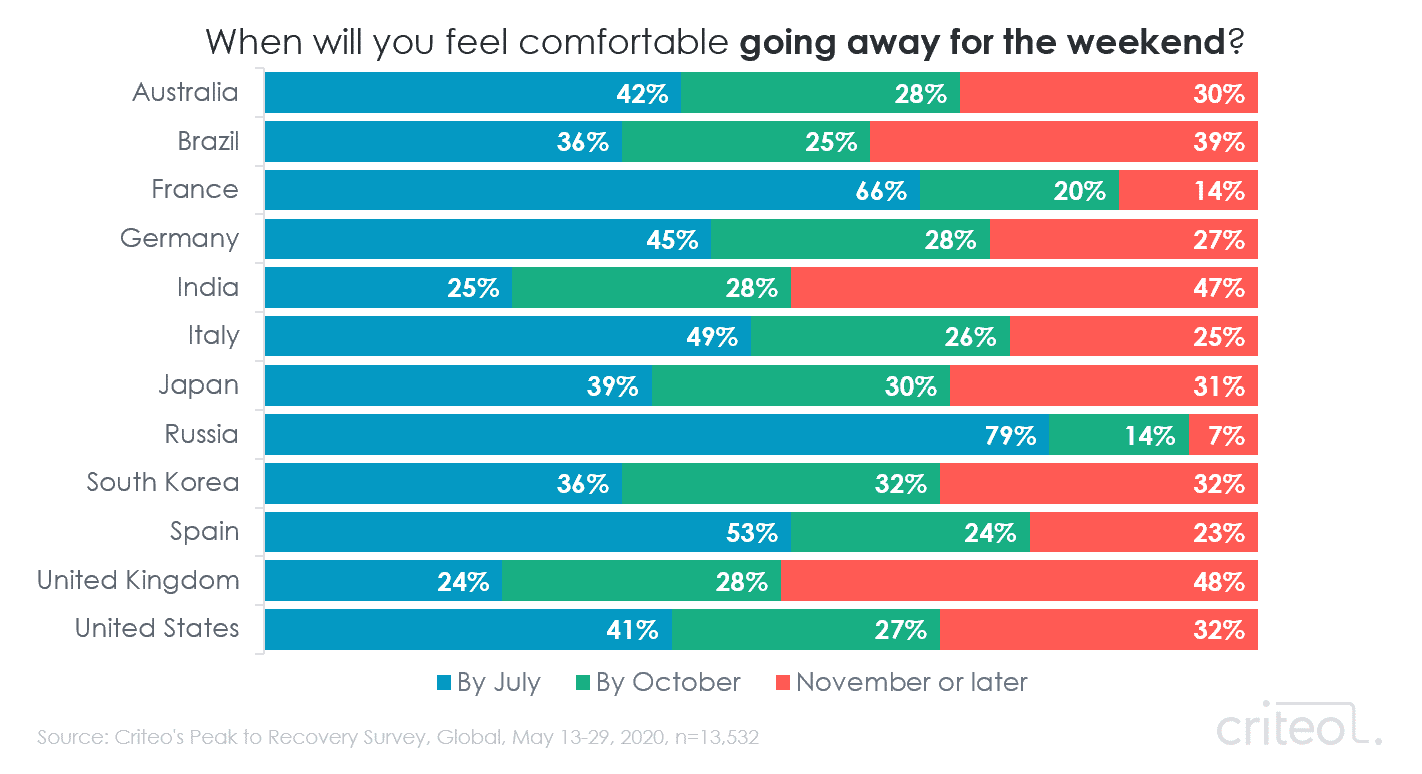
Weekend getaways are just as popular as day trips in many countries, including Brazil, India, Japan, and Spain. Understandably, weekend trips are a little less popular in places like Australia, France, South Korea, and the US, because consumers have to find accommodations where they feel safe to stay a few nights. In Russia however, almost 100% of people say they’ll feel comfortable going away for the weekend by October.
Takeaways for Advertisers
We don’t know what the next phase in the coronavirus crisis will be, but we do know that consumers around the world are getting comfortable with shopping, dining, and traveling again.
Consumers feel different based on their experience during the outbreak and where they live, and you want your ads to speak to their individual preferences. Here are a few ways you can make sure your advertising is relevant to every consumer:
- Use branding creative to put product recommendations and offers in the right context. Use images and messaging to show the value of your products while consumers practice social distancing. For example, don’t show people at a crowded music festival wearing your summer apparel. Show a few friends outdoors in face masks instead.
- Promote your store re-openings in your ads. We know that over half of consumers are ready to return to shopping malls. In markets where your stores are open again, let your in-store shoppers know by targeting audiences built from your offline transaction data.
- Don’t push sales before a consumer shows a strong interest. Travel brands, for example, have to be cautious about promoting hotel reservations and plane tickets before a consumer is ready. Use a full-funnel advertising strategy to reach consumers who are likely to be interested in your brand with one message, and another campaign to reach the consumers that are actively browsing travel options and are ready to buy.
Want more insights from our survey? See the top 10 global shopping trends here:






